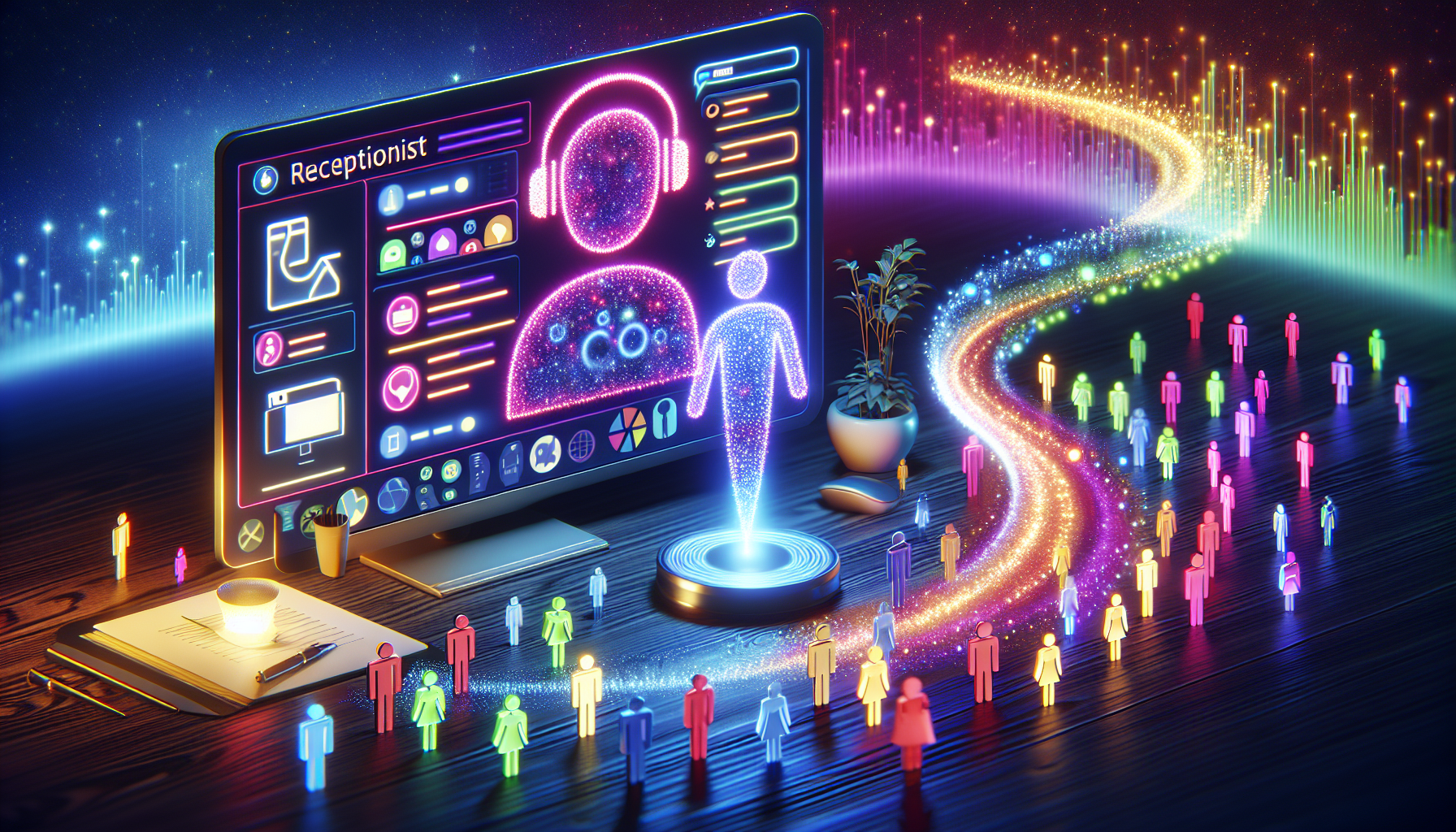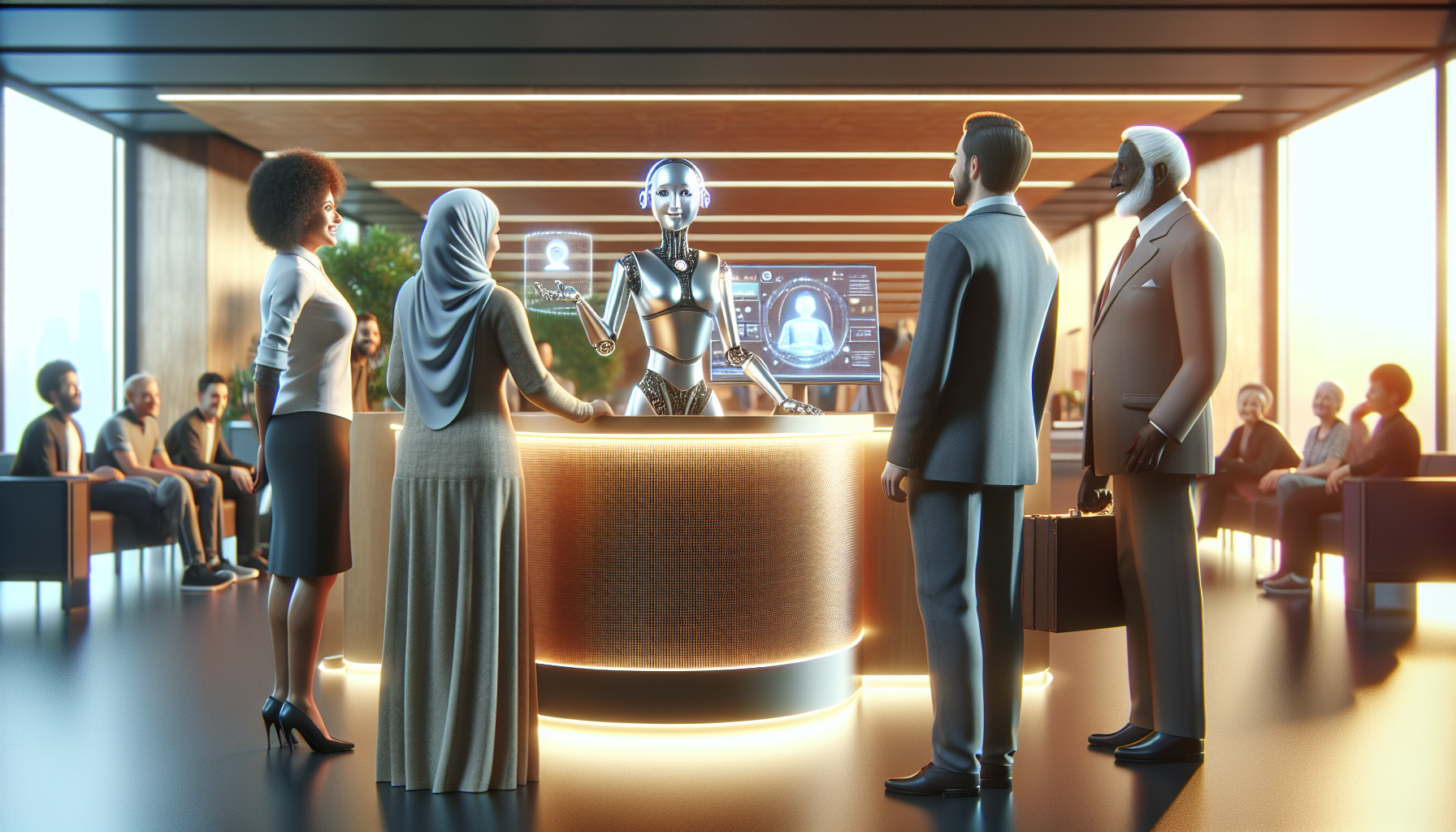
In the rapidly evolving world of business communication, AI Receptionists stand out as a pivotal technological advancement, changing the face of initial customer interactions.
Artificial Intelligence (AI) has infiltrated every sector of industry, serving as a catalyst for innovative solutions. Businesses worldwide are tapping into the enormous potential of AI to enhance their operational efficiency and customer service. One such manifestation of AI in customer service is the advent of AI receptionists.

AI receptionists, sometimes referred to as virtual assistants or intelligent virtual assistants, offer a host of benefits, one of which is improving first call resolution (FCR) rates. These tech-powered receptionists have been programmed to listen, comprehend, and respond appropriately to customer queries, all while exerting minimal waiting time. The enhanced interactivity that AI receptionists bring to the table significantly cuts down on call queues and increases the probability of a customer's issue being resolved during the first point of contact.
So, how exactly do AI receptionists work? They utilise natural language processing (NLP), a branch of AI, to understand and interact in human language. This allows them to engage with customers on a more personalised level, thus ensuring a smoother and faster resolution of issues.
Furthermore, AI receptionists are designed to learn from every interaction they have. With each customer encounter, they become more adept at handling complex queries, thereby continually improving their FCR rates. Also, they work round the clock without fatigue, ensuring that your customer service is always at its best.
In conclusion, AI receptionists bear tremendous promise in enhancing customer service by potentially boosting FCR rates. Embracing this innovation can lead to cost savings, improved customer satisfaction, and a higher profit margin in the long run.
Embarking on the journey of implementing AI receptionists can seem daunting. However, the benefits they offer far outweigh the initial investment and learning curve. By adopting AI receptionists, businesses stand to gain a competitive advantage in an increasingly digital economy.
With the escalating competition in business sectors, first call resolution has become a cardinal aspect that directly impacts customer satisfaction rates. One innovation presenting palpable improvements in this area is the implementation of AI receptionists.
AI receptionists, or virtual receptionists, are programmable digital entities capable of handling customer queries promptly and efficiently. However, it is their integration with other business tools like Customer Relationship Management (CRM) software and project management tools that truly empowers them to elevate first call resolution rates.
AI receptionists cooperate symbiotically with CRMs - they utilise the information stored within these systems to gain context regarding customers’ past interactions, product or service usage, and prior complaints or feedback. Once furnished with this wide-ranging data, the AI can effectively handle customer queries or concerns, often resolving them during the initial call itself.
Moreover, these digital receptionists also take charge of tedious, time-consuming data entry tasks. Every interaction, follow-up, or update is meticulously logged into the system, freeing human operators from this repetitive task. This automated… and flawless... data updating ability greatly enhances customer response efficiency, thereby facilitating improved first call resolution figures.
On top of that, AI receptionists' compatibility with project management tools means they can effectively track project updates, identifying potential issues before they transform into substantial problems. This preemptive action reduces call volumes related to these issues, making resolution on the first call increasingly likely.
In conclusion, the fusion of AI receptionists with CRMs and project management tools creates an ultra-efficient, data-driven environment that supercharges first call resolution metrics. As a result, businesses benefit from higher satisfaction rates, increased trust, and ultimately, expanded customer loyalty.
In the era of digital transformation, first call resolution remains a critical parameter to measure customer satisfaction and loyalty. One prominent technology that has the potential to significantly improve customer service quality, including first call resolution rates, is an AI Receptionist.

An AI-powered receptionist uses natural language processing and machine learning to comprehend customer queries instantly. They don't require breaks or off-hours, ensuring a real-time responsiveness that far exceeds human capacities. Customers are not left waiting on the line; instead, the AI receptionist responds immediately, addressing their concerns and moving towards resolution without delay.
Unlike traditional call center agents who may need to forward inquiries to other departments, causing stretches of waiting time, an AI receptionist can pull data from a vast knowledge base in real-time. By providing immediate and accurate responses, an AI receptionist can significantly reduce the average handling time and thus, vastly enhance the first call resolution rate.
Though AI has a significant role to play in increasing first call resolution rates, it does not eliminate the need for human support. An AI receptionist excels in handling routine inquiries. However, complex issues might still need human intervention. An optimal strategy would be to use AI receptionists for initial problem identification and routing, while reserving human expertise for intricate or sensitive issues.
With continuous advancement in AI technologies, organizations can leverage AI receptionists to improve their first call resolution rates, providing a streamlined, efficient, and seamless customer service experience. Zendesk report reveals that companies using AI for customer service have seen their first-response times drop significantly by up to 95%.
```Artificial Intelligence (AI) technology has surged in recent years, bringing about profound changes in various industries. One of these advancements is the AI receptionist, a technology deployed in call centers to improve first call resolution rates. This piece highlights two case studies where businesses have reported significant improvements since implementing AI receptionists.
XYZ Health Services, a well-established healthcare provider, turned to AI receptionists to tackle its high-volume of incoming calls. According to a statement from the company, before the AI intervention, the firm had a first call resolution rate of 70%.
By integrating an AI receptionist into their system, they were able to improve their first-call resolution rate to 88%. They attributed this success to the AI's ability to quickly match callers with the most appropriate resource, reducing the need for transfers and call backs. The reduced wait time and improved customer service experience were also noted as significant factors to the AI receptionist's success.
ABC Financial Group is a multinational finance firm that deals with a high volume of client calls daily. The firm reported an initial first call resolution rate of just 65%. Given the sensitive and complex nature of financial inquiries, first-call resolution plays a crucial role in client satisfaction.
Once the firm implemented an AI receptionist, their first call resolution rate climaxed at a whopping 82%. Callers were connected to the most appropriate personnel without needing to be transferred, thus saving time and improving client satisfaction. Their automated system also proved great at facilitating after-hours service, reducing the number of follow-up calls.
These success stories reflect just the tip of the iceberg in terms of the potential impact AI receptionists can have on first call resolution rates. AI receptionists are proving to be a powerful tool in enhancing caller services by reducing wait times, improving service hours, and ultimately, boosting first call resolution rates.
Artificial Intelligence (AI) is rapidly transforming all aspects of business operations, but nowhere perhaps is this change more visible than in the realm of customer service. Early adopters have already started harnessing the power of AI receptionists with notable improvements in First Call Resolution (FCR) rates.

AI receptionists are set to become the new frontline of customer service. Using advanced algorithms and machine learning capabilities, these 'virtual assistants' can comprehend a wide range of customer queries, providing accurate, consistent responses in real-time. More importantly, they are capable of resolving most common customer issues during the first interaction itself, significantly improving FCR rates. This not only ensures customer satisfaction but also reduces the workload on human operators, allowing them to handle more complex queries.
The future holds exciting possibilities for AI receptionists. Experts predict that advances in Natural Language Processing (NLP) will further enhance the ability of AI receptionists to understand and address customer issues. Emotional AI or affective computing, a developing field in AI technology, promises to make virtual assistants more 'human-like' in their interactions.
While the benefits are substantial, businesses need to be conscious of the challenges as well. Ensuring data privacy and security, and establishing clear ethical guidelines for AI use are of paramount importance. It is crucial to strike a balance between leveraging AI capabilities and maintaining human touch in customer service.
Taken together, these trends tell us that the era of AI receptionists is just around the corner. Businesses which adapt to these changes, investing in AI technology and incorporating it effectively into their communication strategies, will enjoy a significant competitive edge. Improved FCR rates, happier customers, and more efficient operations — that's the power of AI receptionists.
In conclusion, the integration of AI receptionists in a business setting aptly addresses some of the pressing issues associated with customer service, including helping to improve first call resolution rates. AI receptionist systems, through their innovative technologies, provide round-the-clock service and reduce the waiting time, ensuring that customer queries are handled expediently.
Moreover, these advanced systems are adept at understanding and processing complicated requests, all but eliminating the human errors often associated with high volume call traffic. Leveraging the power of AI in customer service allows companies not only to enhance customer satisfaction but also to streamline operations by diverting routine inquiries away from call center staff.
Taking a step towards adopting such AI-driven technology will undoubtedly pay dividends in terms of increased customer loyalty and reduced operational costs. However, it's important to remember that even though the role of an AI receptionist is significant, it doesn't replace the need for a well-trained customer service team. Instead, it complements human efforts by managing routine tasks, enabling the human staff to focus on more complex, sensitive, or strategic issues.
Hence, companies considering AI receptionist technology need to take a two-pronged approach: integrating technology into their infrastructure while also investing in human skills and training. Due to the quickly advancing landscape of AI, staying up-to-date with the latest advancements is vital. Websites such as AI Weekly or AiThority provide valuable resources to keep abreast with the latest updates in AI technologies.
In the end, achieving a high first call resolution rate is not just about adopting the latest technology, but about how well you utilize it in alignment with your experienced, human team members. Investing wisely in both technology and training can help you reach the elusive goal of delivering flawless customer service.
```Start your free trial for My AI Front Desk today, it takes minutes to setup!








